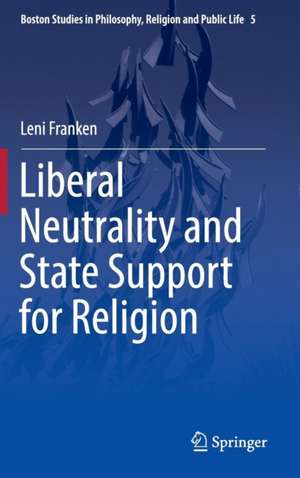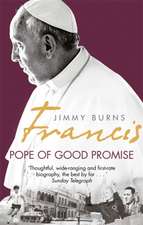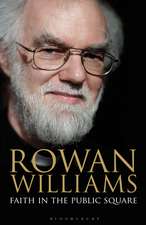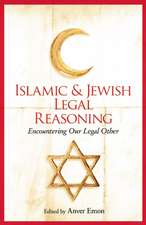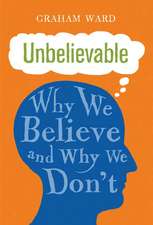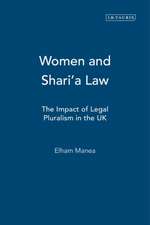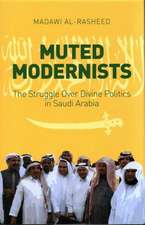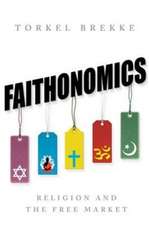Liberal Neutrality and State Support for Religion: Boston Studies in Philosophy, Religion and Public Life, cartea 5
Autor Leni Frankenen Limba Engleză Hardback – 26 mai 2016
| Toate formatele și edițiile | Preț | Express |
|---|---|---|
| Paperback (1) | 637.13 lei 6-8 săpt. | |
| Springer International Publishing – 27 mai 2018 | 637.13 lei 6-8 săpt. | |
| Hardback (1) | 643.34 lei 6-8 săpt. | |
| Springer International Publishing – 26 mai 2016 | 643.34 lei 6-8 săpt. |
Preț: 643.34 lei
Preț vechi: 756.86 lei
-15% Nou
Puncte Express: 965
Preț estimativ în valută:
123.10€ • 128.53$ • 101.88£
123.10€ • 128.53$ • 101.88£
Carte tipărită la comandă
Livrare economică 04-18 aprilie
Preluare comenzi: 021 569.72.76
Specificații
ISBN-13: 9783319289427
ISBN-10: 331928942X
Pagini: 219
Ilustrații: XIII, 211 p.
Dimensiuni: 155 x 235 x 14 mm
Greutate: 0.5 kg
Ediția:1st ed. 2016
Editura: Springer International Publishing
Colecția Springer
Seria Boston Studies in Philosophy, Religion and Public Life
Locul publicării:Cham, Switzerland
ISBN-10: 331928942X
Pagini: 219
Ilustrații: XIII, 211 p.
Dimensiuni: 155 x 235 x 14 mm
Greutate: 0.5 kg
Ediția:1st ed. 2016
Editura: Springer International Publishing
Colecția Springer
Seria Boston Studies in Philosophy, Religion and Public Life
Locul publicării:Cham, Switzerland
Public țintă
ResearchCuprins
Part 1: Liberalism and Neutrality.- Chapter 1: Liberalism and Neutrality – a philosophical Exploration.- Chapter 2: Neutrality and Autonomy.- Chapter 3: Autonomy and valuable Options: Raz, Kymlicka and Chan.- Chapter 4: Reformation Liberalism: non-autonomy based.- Conclusion Part 1.- Part 2: Autonomy-based Liberalism and active State Support for valuable Options.- Chapter 5: Can a liberal State support Art?.- Chapter 6: Liberal State Support for Art and liberal Neutrality: Criteria.- Chapter 7: Active State Support for Religions and liberal Neutrality: Criteria.- Chapter 8: Active State Support for faith-based Schools.- Chapter 9: Active State Support for Religious Education.- Conclusion Part 2.- Part 3: Church-state Models and Neutrality.- Chapter 10: Church-state Models in an international Perspective.- Chapter 11: Political Secularism: passive and assertive.- Chapter 12: Active State Support for Religions.- Chapter 13: State Church.- Conclusion Part 3.- Part 4: General Conclusion: liberal Neutrality and active State Support for Religions: a Contradiction in Terms?.- Bibliography.
Recenzii
“The particular richness and real contribution of Leni Franken’s work is the application of liberal theories of justice, which are rarely focused on religion, to the question of the legitimacy of financial state support for religion. … Leni Franken’s work shows that, even though we cannot claim that a state should finance religion in order to be neutral in a political liberal sense, we can at least say that the state can consider such financial support, without losing its neutrality.” (Stéphanie Wattier, Revue de droit international et de droit comparé, April, 2017)
“Franken has written an excellent and clear book on the question of the relations between State and Church and on the question of State support for religion within the context of liberalism Writing. ... I recommend this book not only to philosophers, theologians and political thinkers,but also to politicians, especially liberal politicians.” (Norbert Campagna, Ethical Perspectives, Vol. 24 (2), 2017)
“This volume collates the work of top scholars in the field. … A number of concrete church-state models, including hands-off, religious accommodation and the state church are evaluated, and the book gives some recommendations in order to optimize those church-state models, where needed. Practitioners and scholars of politics, law, philosophy and education, especially religious education, will find this work of particular interest as it has useful guidelines on policies and practices, as well as studies of church-state models.” (Georg Neureither, Religion - Weltanschauung - Recht (RWR), religion-weltanschauung-recht.net, May, 2016)
“Franken has written an excellent and clear book on the question of the relations between State and Church and on the question of State support for religion within the context of liberalism Writing. ... I recommend this book not only to philosophers, theologians and political thinkers,but also to politicians, especially liberal politicians.” (Norbert Campagna, Ethical Perspectives, Vol. 24 (2), 2017)
“This volume collates the work of top scholars in the field. … A number of concrete church-state models, including hands-off, religious accommodation and the state church are evaluated, and the book gives some recommendations in order to optimize those church-state models, where needed. Practitioners and scholars of politics, law, philosophy and education, especially religious education, will find this work of particular interest as it has useful guidelines on policies and practices, as well as studies of church-state models.” (Georg Neureither, Religion - Weltanschauung - Recht (RWR), religion-weltanschauung-recht.net, May, 2016)
Notă biografică
Leni Franken is a postdoctoral researcher at the University of Antwerp (Belgium). Her research interests are political and autonomy-based liberalism, church-state relations, neutrality, faith-based schools and religious education. In 2011, she edited Religious Education in a Plural, Secularized Society (Waxmann)
Textul de pe ultima copertă
This book focuses on the financing of religions, examining some European church-state models, using a philosophical methodology. The work defends autonomy-based liberalism and elaborates how this liberalism can meet the requirements of liberal neutrality. The chapters also explore religious education and the financing of institutionalized religion. This volume collates the work of top scholars in the field. Starting from the idea that autonomy-based liberalism is an adequate framework for the requirement of liberal neutrality, the author elaborates why a liberal state can support religions and how she should do this, without violating the principle of neutrality. Taking into account the principle of religious freedom and the separation of church and state, this work explores which criteria the state should take into account when she actively supports religions, faith-based schools and religious education. A number of concrete church-state models, including hands-off, religious accommodation and the state church are evaluated, and the book gives some recommendations in order to optimize those church-state models, where needed. Practitioners and scholars of politics, law, philosophy and education, especially religious education, will find this work of particular interest as it has useful guidelines on policies and practices, as well as studies of church-state models.
Caracteristici
Exposes the contemporary relationship between religion and the state from a philosophical perspective Presents a philosophical argumentation for church-financing and for a hands-off policy toward religion whilst systematically elaborating the conditions for financing Provides useful guidelines to improve actual church-state policies Collates the work of a group of top scholars on the much debated issue of liberal neutrality Includes supplementary material: sn.pub/extras
